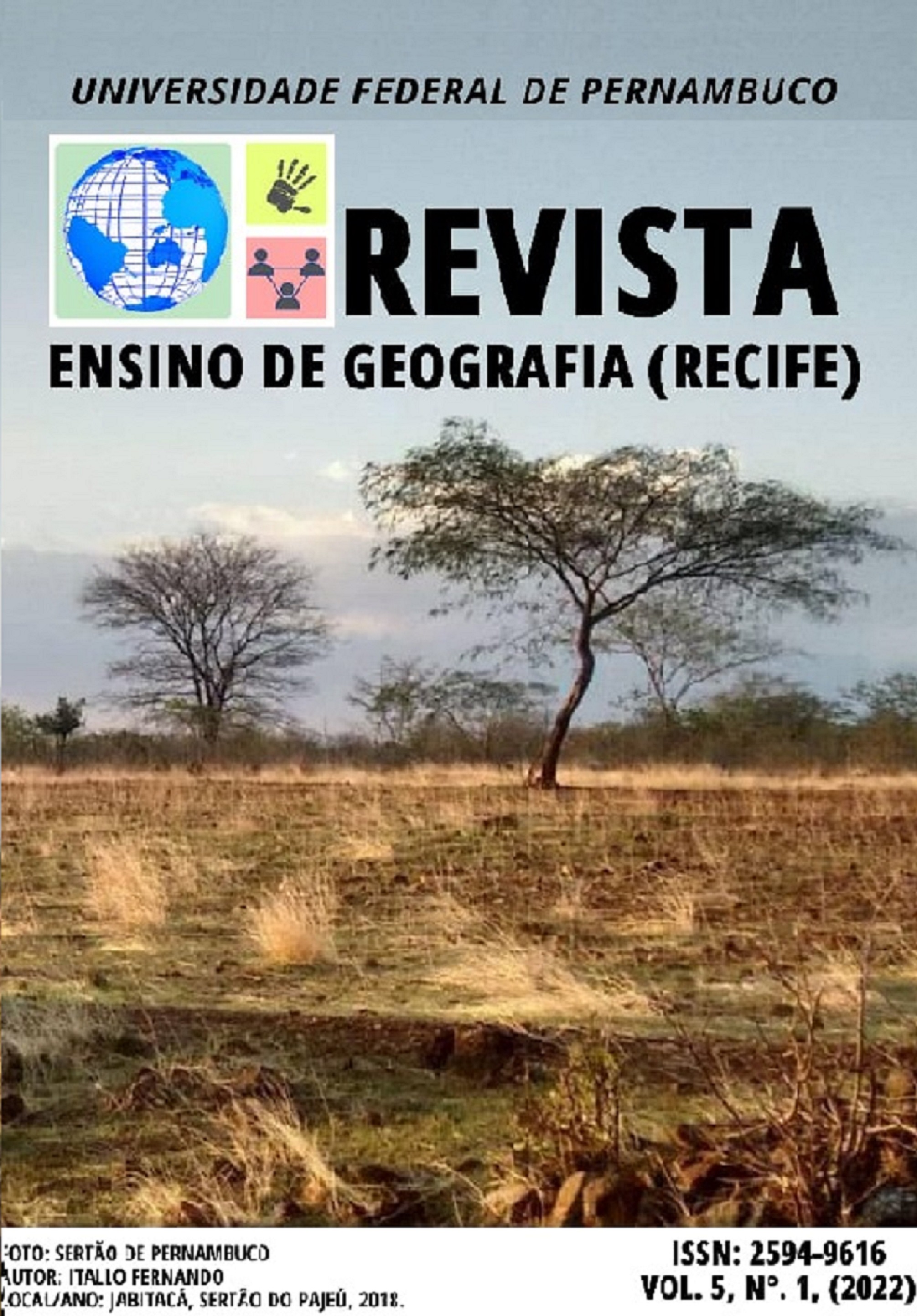Teaching-learning process and geographic thinking: a literature review
DOI:
https://doi.org/10.51359/2594-9616.2022.251412Keywords:
Appropriation of geographic knowledge, Cartographic literacy, geographic thinking or reasoning, Pedagogical contentknowledgeAbstract
The teaching-learning processes related to the geographic contents must be present in the school everyday life, for that the teacher needs to search for the domain and pedagogical knowledge of the content to be worked, since they are involved by methods and ways to make them effective. From this, this article aims to provide readers with knowledge about some of the ways and means to build knowledge in the formative journey of students in basic education. This teaching-learning process begins in the first year of elementary school, and is implemented in the formative process through cartographic literacy. In the methodology presented in this work, it is necessary for the students to make abstractions and generalizations of the content. Thus, during this formative path, there are external and internal processes that act on the mental activities of these students, which are linked in a link between empirical and theoretical, which opens possibilities and paths for the construction of knowledge. In this methodology, it is reported that the students, when they are inserted in this teaching-learning process, gradually build knowledge, until it reaches its finalization, characterized by the concretization of thought. This succession of learning results from the development of competencies and abilities, which are developed from the intellectual capacity of each student, so that they are able to learn by themselves. Aiming at the concreteness, effectiveness and excellence of the teaching-learning process in the elementary school environment, this work proposes that teachers take advantage of means and methods that are consistent with the reality and experiences of the target audience, in order to promote to their students,the expansion and understanding of the geographic world in its various scales, seeking to relate the scientific content with everyday life, from contexts closer to macro scales
References
AZAMBUJA, Leonardo Dirceu de. O problema-tema e a situação geográfica propostos na BNCC e o ensino-aprendizagem da Geografia. Signos Geográficos, Goiânia-GO, V.2, 2020.
BRASIL. Secretaria de Educação Fundamental. Parâmetros curriculares nacionais: Geografia / Secretaria de Educação Fundamental. Brasília: MEC/ SEF, 1998.
BRASIL. Ministério da Educação. Base Nacional Comum Curricular: Versão Final. Brasília: MEC, 2018(a). Disponível em: <http://basenacionalcomum.mec.gov.br/a-base> Acesso em: 31 de maio de 2021.
CALLAI, et al. O ensino de Geografia nos trabalhos apresentados no XI Enanpege. Revista da Associação Nacional de Pós-graduação e pesquisa em geografia (Anpege). V. 12, n. 18, especial, p. 43-55, 2016.
CASTELLAR, Sonia M.V. Ensinar Geografia por meio da Cartografia escolar: o raciocínio espacial. In RABELO, K. e BUENO, M. (orgs.) Currículo, políticas públicas e ensino de geografia. Goiás, Ed. PUC-Goiás, NEPEG, p. 195-212. 2015.
CAVALCANTI, L. de S. Ensinar geografia para a autonomia ao pensamento: O desafio de superar dualismos pelo pensamento teórico crítico. Revista da ANPEGE, v. 7, n. 1, número especial, p. 193-203, out. 2011.
______. A Geografia e a realidade escolar contemporânea: Avanços, caminhos, alternativas. In: Anais do I Seminário Nacional: Currículo em movimento - Perspectivas Atuais, Belo Horizonte, novembro de 2010.
CHERVEL, A. História das disciplinas escolares: reflexões sobre um campo de pesquisa. Teoria & Educação. Porto Alegre, n. 2, p. 177-229, 1990.
LESTEGÁS, F. R. A Construção do conhecimento geográfico escolar: do modelo transpositivo à consideração disciplinar da Geografia In: CASTELLAR, S. M. V.; MUNHOZ, G. B. Conhecimentos escolares e caminhos metodológicos. São Paulo: Xamã, p. 13-127, 2012.
LIBÂNEO, José Carlos. Formação de professores e didática para o desenvolvimento humano. Educação e Realidade. Porto Alegre, v. 40, n.2 2015.
______. A teoria do ensino para o desenvolvimento humano e o planejamento de ensino. Educativa, Goiânia, v. 19, n. 2, p. 353-387, 2016.
LIMA, Maria das Graças. Uma leitura sobre propostas curriculares de Geografia no Brasil: 1986-2018. Ar@cne. Revista Electrónica de Recursos de Internet sobre Geografía y Ciencias Sociales. Barcelona: Universidad de Barcelona, 1 de novembro de 2020, vol. XXIV, nº 248.
LOPES, C. S.; PONTUSCHKA, N. N. O conhecimento Pedagógico do conteúdo na prática profissional de professores de Geografia. Geousp. São Paulo, v. 19, n. 1, p. 76-92, jan./abr. 2015.
MENEZES, Ebenezer Takuno de. Verbete Escola Nova. Dicionário Interativo da Educação Brasileira - EducaBrasil. São Paulo: Midiamix Editora, 2001. Disponível em <https://www.educabrasil.com.br/escola-nova/>. Acesso em 25 de maio de 2021.
PENA, R. A. Brasil escola Vidal de La Blache. Disponível em:<https://brasilescola.uol.com.br/geografia/vidal-la-blache.htm>. Acesso em 24 de maio de 2021.
PONTUSCHKA, N. N.: A geografia: pesquisa e ensino In: CARLOS, A. F, A:Novos caminhos da geografia. São Paulo: Contexto, 2001.
SHULMAN, L. S. Conocimiento y enseñanza: fundamentos de la nueva reforma. Profesorado. Revista de Currículum y Formación del Profesorado. Granada, Espanha, ano 9, n. 2, p. 1-30, 2005b. Disponível em: <http://www.ugr.es/~recfpro/rev92ART1.pdf>. Acesso em: 01 de junho de 2021.
Downloads
Published
How to Cite
Issue
Section
License
Copyright (c) 2022 Clayton de Oliveira Bossoni

This work is licensed under a Creative Commons Attribution 4.0 International License.
Authors who publish with this journal agree to the following terms:- Authors retain copyright and grant the REVISTA ENSINO DE GEOGRAFIA (RECIFE) right of first publication with the work simultaneously licensed under a Creative Commons Attribution NonCommercial International 4.0 (CC BY-NC) that allows others to share the work with an acknowledgement of the work's authorship and initial publication in this journal.
- Authors are able to enter into separate, additional contractual arrangements for the non-exclusive distribution of the journal's published version of the work (e.g., post it to an institutional repository or publish it in a book), with an acknowledgement of its initial publication in this journal.
- Authors are permitted and encouraged to post their work online (e.g., in institutional repositories or on their website) prior to and during the submission process, as it can lead to productive exchanges, as well as earlier and greater citation of published work.



